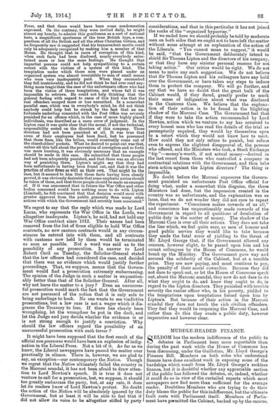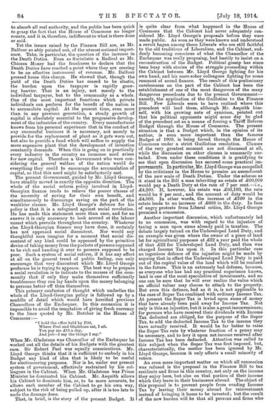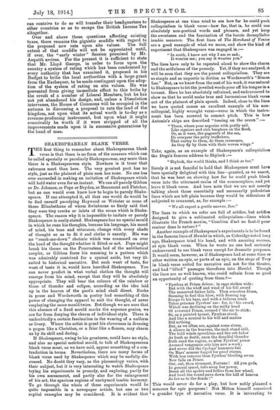MUDDLE-HEADED FINANCE.
SELDOM has the modern indifference of the public to debates in Parliament been more regrettable than during the past week while the House of Commons has been discussing, under the Guillotine, Mr. Lloyd George's Finance Bill. Members on both sides who understand finance have done excellent work in exposing some of the hardships which result from Mr. Lloyd George's reckless finance, but it is doubtful whether any appreciable section of the public has followed the debates, or, indeed, whether it could do so in view of the curtailed reports which most newspapers now find more than sufficient for the average reader. Doubtless Members who are trying to do their duty blame the public for this indifference, but the ultimate fault rests with Parliament itself. Members of Parlia- ment have permitted the Cabinet, backed up by the caucus. -to absorb all real authority, and the public has been quick to grasp the fact that the House of Commons no longer counts, and it is, therefore, indifferent to what is there done or said.
Yet the issues raised by the Finance Bill are, as Mr. Balfour so ably pointed out, of the utmost national import- ance. Take, in particular, the question of the increase in the Death Duties. Even so Socialistic a Radical as Mr. Chiozza Money had the frankness to declare that the Death Duties have reached a point where they are ceasing to be an effective instrument of revenue. Mr. Balfour pressed home this charge. He showed that, though the yield of the Death Duties has ceased to be elastic, the burden upon the taxpayer is rapidly grow- ing heavier. That is an injury, not merely to the individual taxpayer, but to the community as a whole. One of the most important functions which private individuals can perform for the benefit of the nation is to accumulate capital. At the present time, even more than in any previous generation, a steady growth of capital is absolutely essential to the progressive develop- ment of the industries of the country. Every manufacturer knows from his personal experience that in the conduct of any successful business it is necessary, not merely to provide for the replacement of plant as it gets worn out, but also to provide a fund which will suffice to supply the more expensive plant that the development of invention constantly demands. When this is going on in practically every industry in the country an immense need arises for new capital. Therefore a Government who were con- sidering the general welfare of the nation would do everything they could to encourage the accumulation of capital, so that this need might be satisfactorily met. The present Government, guided by Mr. Lloyd George, have steadily moved in exactly the opposite direction. The whole of the social reform policy involved in Lloyd- Georgian finance tends to relieve the poorer classes of the necessity of saving for their own benefit, and simultaneously to discourage saving on the part of the wealthier classes. Mr. Lloyd George's defence for his policy is that it is a safeguard against social revolution. He has made this statement more than once, and for an answer it is only necessary to look around at the labour unrest which prevails throughout the country. Whatever else Lloyd-Georgian finance may have done, it certainly has not appeased social discontent. Nor would any thoughtful man imagine for a moment that social dis- content of any kind could be appeased by the primitive device of taking money from the pockets of persons supposed to be rich and handing it over to persons supposed to be poor. Such a system of social reform, if it has any effect at all on the general trend of public feeling, can only encourage that very discontent which Mr. Lloyd George professes he is trying to appease. The best way to prepare a social revolution is to indicate to the masses of the com- munity that if only they make themselves sufficiently troublesome they can lay hands upon the money belonging to persons better off than themselves.
This primary confusion of thought which underlies the whole of the Lloyd-Georgian policy is followed up by a muddle of detail which would have horrified previous Chancellors of the Exchequer. In this connexion it is impossible to avoid the temptation of giving fresh currency to the lines quoted by Mr. Butcher in the House of Commons :- "I hold the office held by Pitt, Where Peel and Gladstone sat, I sit.
You pay me £15 a day,
And yet—I say the things I say."
When Mr. Gladstone was Chancellor of the Exchequer he worked out all the details of his Budgets with the greatest care. Sir Robert Peol was equally conscientious. Mr. Lloyd George thinks that it is sufficient to embody in his Budget any kind of idea that is likely to be useful for electioneering purposes. Nor is he, under our present system of government, effectively restrained by his col- leagues in the Cabinet. When Mr. Gladstone was Prime Minister he dominated his Cabinet. Mr. Asquith allows his Cabinet to dominate him, or, to be more accurate, he allows each member of the Cabinet to go his own way, subject to the risk of being pulled up, after it is too late to undo the damage done.
That, in brief, is the story of the present Budget. It is quite clear from what happened in the House of Commons that the Cabinet had never adequately con- sidered Mr. Lloyd George's proposals before they were made public. As soon as they were known and understood a revolt began among those Liberals who are still faithful to the old traditions of Liberalism, and the Cabinet, sud- denly becoming conscious of what the Chancellor of the Exchequer was really proposing, had hastily to insist on a reconstruction of the Budget. Political gossip has since been busy with stories of the struggle proceeding within the Cabinet between Mr. Lloyd George fighting for his own hand, and his more sober colleagues fighting for some remnant of sound finance. The result of this preliminary carelessness on the part of the Cabinet has been the establishment of one of the most dangerous of the many dangerous precedents due to the present Government— namely, the application of the Guillotine to the Finance Bill. Few Liberals seem to have realized where this precedent will lead them, although Mr. Asquith him- self, with his growing note of cynicism, pointed out that his political opponents might some day be glad of the precedent set as a means of forcing a Tariff Reform Budget through the House of Commons. The present situation is that a Budget which, in the opinion of its author, is even more important than the famous Budget of 1909, is being forced through the House of Commons under a strict Guillotine resolution. Clauses of the very greatest moment are not discussed at all, while the discussion on other clauses is summarily cur- tailed. Even under these conditions it is gratifying to see that open discussion has secured some practical im- provements. In particular, Mr. Lloyd George was compelled by the criticisms in the House to promise an amendment of the new scale of Death Duties. Under the scheme as it stood in the Bill a man inheriting an estate of £60,000 would pay a Death Duty at the rate of 7 per cent.—i.e., £4,200. If, however, his estate was £60,100, the rate would be 8 per cent., and the amount of duty would be £4,808. In other words, the increase of £100 in the estate leads to an increase of £608 in the duty. In face of angry protests from Liberal critics, Mr. Lloyd George promised a concession.
Another important discussion, which unfortunately led to no concession, was with regard to the injustice of taxing a man upon sums already paid in taxation. The debate largely turned on the Undeveloped Land Duty, and an example was given where the owner of a. piece of land let for agricultural purposes at £22 a year paid the whole of that £22 for Undeveloped Land Duty, and then was charged Income Tax upon it. In this particular case an ingenious defence of the injustice might be made by arguing that in effect the Undeveloped Land Duty is paid out of the capital value of the land which will be realized in the future. This is an extremely bad defence, because, as everyone who has had any practical experience knows, land is one of the most speculative of investments, and no one can be sure that he will ever realize the value which an official valuer may choose to attach to the property. But even this defence, bad as it is, is not applicable to the case of Super Tax combined with ordinary Income Tax. At present the Super Tax is levied upon sums of money that have already been paid away for Income Tax. Not only is this an injustice, but it is also a great inconvenience; for persons who have received their dividends with Income Tax, deducted are obliged, for the purpose of the Super Tax, to add the deducted Income Tax to the income they have actually received. It would be far better to raise the Super Tax rate by whatever fraction of a penny may be necessary, and to levy it upon net income received after Income Tax has been deducted. Attention was called to this subject when the Super Tax was first imposed, but, characteristically, the matter has been ignored by Mr. Lloyd George, because it only affects a small minority of voters.
An even more important matter on which all concession was refused is the proposal in the Finance Bill to tax residents and firms in this country, not only on the income they enjoy here, but also on that portion of their income which they leave in their businesses abroad. The object of this proposal is to prevent people from evading Income Tax by leaving their money abroad for reinvestment instead of bringing it home to be invested ; but the result of the new burden will be that all persons and firms who
can contrive to do so will transfer their headquarters to other countries so as to escape the British Income Tax altogether.
Over and above these questions affecting existing taxes, there remains the gigantic muddle with regard to the proposed new rate upon site values. The full extent of that muddle will not be appreciated until, if ever, the "early winter" Session promised by Mr. Asquith arrives. For the present it is sufficient to state that Mr. Lloyd George, in order to force upon the country a system of rating which has been condemned by every authority that has examined it, proposed in his Budget to bribe the local authorities with a large grant from the Exchequer, to be made contingent upon the adop- tion of the system of rating on site values. He was prevented from giving immediate effect to this bribe by the revolt of a number of Liberal Members, but he, has not yet abandoned his design, and, unless a Dissolution intervenes, the House of Commons will be occupied in the autumn in discussing a proposal to rate the land of the kingdom, not upon what its actual worth is to-day as a revenue-producing instrument, but upon what it might conceivably be worth if it were stripped of all the improvements made upon it in successive generations by the hand of man.












































 Previous page
Previous page